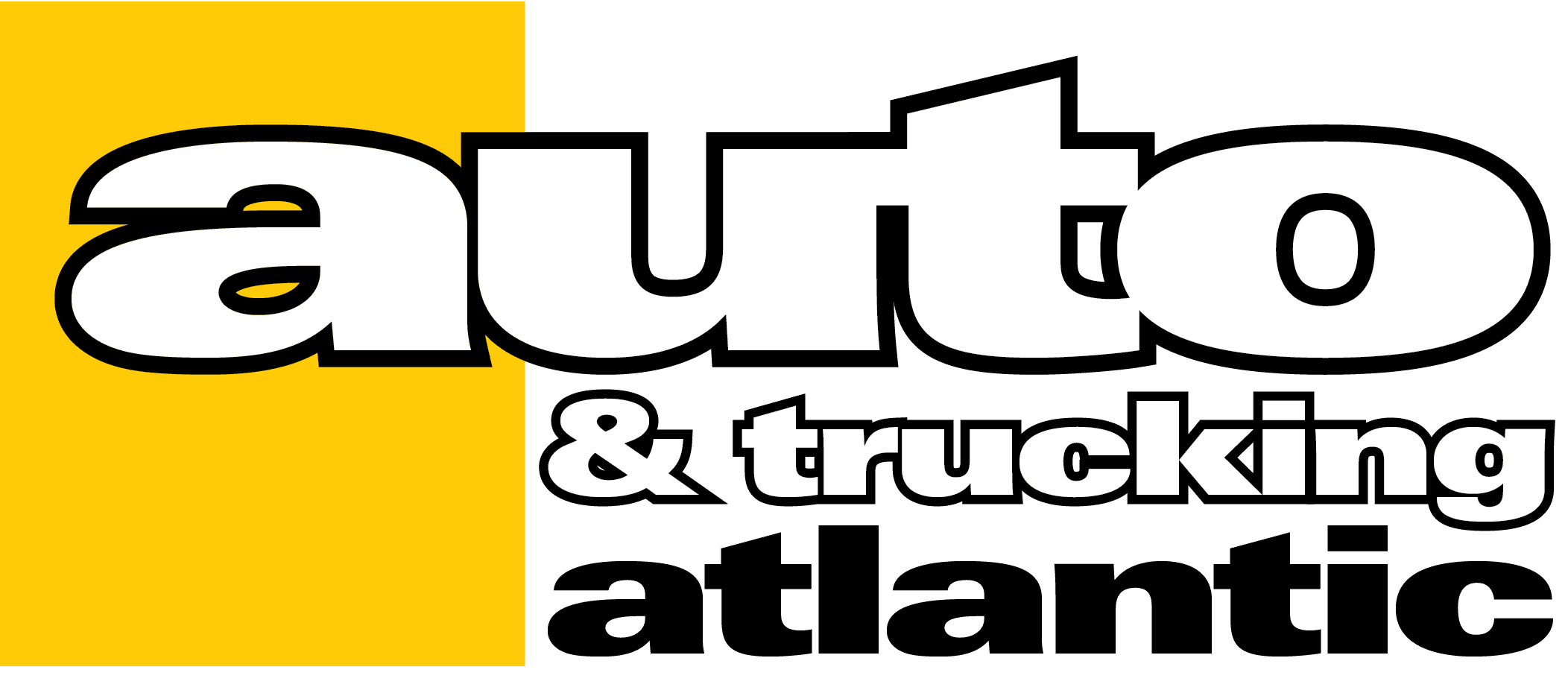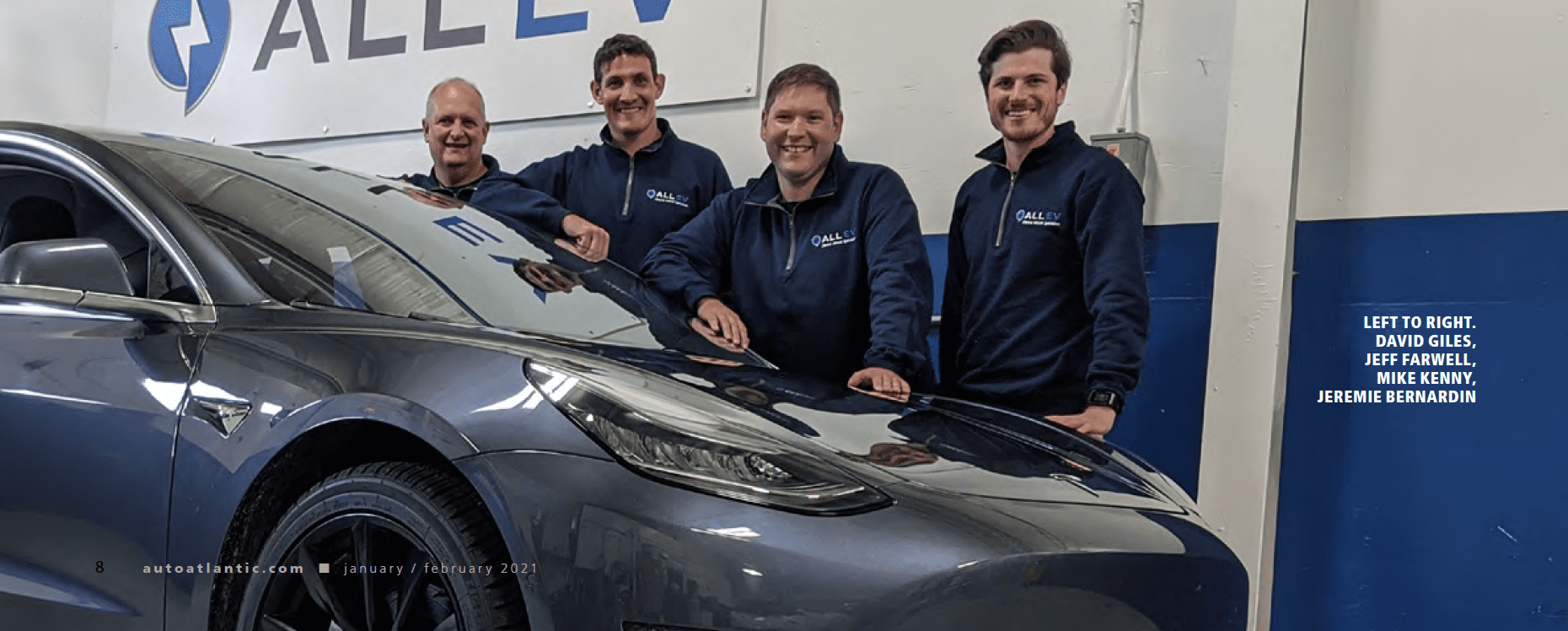A look at human resources inside Canada’s automotive industry
By Kristen Lipscombe
For Dartmouth, NS electric car store ALLEV, the ongoing pandemic hasn’t posed much of a problem.
In fact, the forward-thinking vehicle store, nestled among the many other businesses within the well-known Burnside Industrial Park in Dartmouth, N.S., opened its doors in January 2020, right before the COVID-19 craze hit Canada. And the company is growing, including a small second location in Charlottetown, P.E.I. – and succeeding – despite current pandemic pressure on economies both here at home and abroad. David Giles, vice-president of ALL EV Canada, Ltd., credits much of this incredible success to the senses of comradery and teamwork among a diverse group of staff members, from the executives running the show to the technicians on the ground floor.
“We’re trying to make it like a family,” Giles said of both ALL EV’s approach to human resources and the general day-to-day atmosphere inside the new Nova Scotia shop. “We want everyone to feel important. We do have a job to do so we hold each other accountable.” Another important value the company emphasizes as part of its human resources mandate is “integrity.” “We are new, so we are excited, obviously. We are excited about the product we are helping because it is a green initiative as well as electrification and convenience,” Giles said. “Our philosophy is basically helping educate any customer that comes in.”
“A lot of times dealers are looking at numbers, cars … but we feel that the shift of going to gas and diesel to eletric is, people are sampling the water; they’re not really sure,” Giles said, “so our philosophy is about not making the sale, but really making a believer.” ALL EV has also been committed to diversity and inclusion since first starting their business. “We have a woman that is an apprentice with us and we heavily engage with ISANS,” Giles said of his role as co-chair of the Immigrant Services Association of Nova Scotia.
“Really, the industry is changing so dramatically in the automotive sector, so we’ve got to try and introduce new people to the trades,” he said. “The trades are starting to evolve, especially with electric vehicles and how repairs are done, and the thought processes; … (these) are very high-tech positions.”
“We look for people who are very open-minded when it comes to learning new technologies,” Giles said. Martin Szydlowski, human resources business partner with NAPA Auto Parts, isn’t surprised to see the success of companies such as ALL EV, particularly with such strong HR policies already in place.
He also believes the Canadian auto industry has been ahead of the curve in terms of how it has handled the COVID-19 pandemic. “I’ve been in HR now for a number of years and I remember dealing with SARS,” said Szydlowski, who is based in Cambridge, Ont., but oversees several Canadian geographical regions including Ontario, Manitoba and Saskatchewan. He also looks after several different divisions including heavy duty vehicles and the importation of parts from both Asia and Europe. These regions and divisions consist of about 1,400 employees total.
“Back then, even, we were starting to put together some pandemic manuals, and how to deal with infectious diseases. We had an emergency response plan, hand sanitizers and different technologies that would allow us not to have as much biological exposure; so SARS sort of started it all for us.” Of course, the sudden onset of COVID-19 last March still came as a surprise to all of us, and there’s no real rulebook on how to handle a pandemic, but the auto industry responded quickly and swiftly to protect its employees and customers alike.
“It was a bit of a challenge, starting to deal with it all … and understand the timing of the virus, the incubation, the infectious timeline of it and kind of tracing back and working through it for our risk analysis,” Szydlowski recalled.
“That’s what we do now, any time we have a store manager or business manager call us and say, ‘hey, I have an employee who is maybe showing symptoms,’ ” he said. “It’s basically walking through a risk assessment of exposure in the workplace … Who did they talk to? Who did they deal with? And we follow the key safety protocols we have in place as a company.”
Other important safety measures include physical distancing, of course, “and wearing mask at all times.”“We have company-supplied medical-grade masks,” Szydlowski said. “They’re three-plied blue masks that we found were the best protection for our employees; they have 85-87 per cent filtration, allowing for that high safety.” “We ask all our employees to wear them,” he said. “To wear them when they can’t physically distance, to wear them when they’re walking through the business units, or if you are walking from your office to the lunch room or a common area or what have you, people have to have their masks on. In some cases, in our distribution centres and stores, we ask them to wear masks at all times.”
Personal hygiene such as handwashing and hand-sanitizing is also strongly emphasized, while cleaning and disinfecting common areas is enforced by strict schedules. Managers are also responsible for health screening their own employees daily, Szydlowski said. Curbside pick-ups, deliveries, limiting customer interactions in store, providing masks for customers, Plexiglass dividers in stores, and floor stickers and signs indicating physical distance are all other ways that the auto industry has “put the focus … on health and safety.”
“That not only includes COVID, but now translates into mental health; people dealing with COVID fatigue and pandemic fatigue and not being able to see friends or family and isolating or quarantining, and everything we’re dealing with in terms of lockdowns,” Szydlowski said. “We offer a number of supports such as the employee assistance and family service, we have support workers who can connect with medical or guidance type of psychological advice through our health insurance carrier, we’ve got podcasts and training available on ways to deal with difficult situations and manage stress and how to cope,” he added.
“And then obviously our managers are trained to listen, talk, engage and look out for the mental health of their staff and how people are dealing with certain situations. We’re taking a very proactive approach in order for us to ensure that we are being preventive in our battle with the pandemic, or the virus, rather than reacting to it.”
Szydlowski pointed out that many of these measures were in place across NAPA’s facilities before any such regulations were mandated by provincial governments and Public Health offices.
“We were already ahead of the game,” he said. “I remember the first time I had to deal with a potential COVID situation at one of our business units. When we had the review with Public Health and the nurses that were responsible for that particular case, … we were already above and beyond what their expectations are, so we were getting quite a bit of praise … for the proactive work that we had already implemented.”
Outside of pandemic protocol, there are other top HR priorities across the auto industry still being on worked hard on daily behind the scenes. Those include staying ahead of the market and keeping competitive, staying on top of changing technology, ensuring customer expectations are met and exceeded, “and making sure that we as a service company can successfully continue our business in the time of the Amazons of the world,” Szydlowski said.
“It’s making sure that we provide that high-level support, that we focus on the customer experience and that we have the product, the knowledge and the support to provide to our customers in order for them to be successful.” Diversity and inclusion also remain important focuses for human resources professionals within the auto sector. “It’s a big part of our day-to-day,” Szydlowski said, adding his department works hard to reach out to different communities and educate employees on the importance of diversity and inclusion in the workplace.
“We have a lot of employees of various cultural backgrounds, coming from all over the world, that are in key positions, taking on key leadership roles and are changing the overall feel of the industry that would have been many years ago considered to be a boys’ club – it is no more.” Ensuring workplace harassment doesn’t happen, dealing with it appropriately when it does and protecting the rights of all employees are also “taken very seriously with a high-level of commitment.” “In all different levels of the company, right from executives, senior VPs and management to positions in the stores or in warehouses or in service businesses, (our human resources policies) allow us all to flourish.”
At the end of the day, it’s the people that keep NAPA going day in and day out. That’s why there is also a major focus on “positive employee experience,” Szydlowski said. “We do a lot of things like employee engagement surveys and understanding the feedback that we receive through those surveys.” “It’s making sure that we have a great onboarding experience, that the way we integrate our employees and guide them through their position within a company is a successful and positive experience for them.”
Ensuring their diverse team members have positive experiences in their new workplace is exactly what ALL EV encourages as well, and those workplace values seem to be paying off despite the pandemic. “It actually went really well; COVID actually didn’t hurt us at all,” Giles said of plugging his business into the competitive auto industry market during what has been a tense time for companies big, medium and small around the world.
“We sold cars and we opened a second dealer during COVID,” Giles said. “I think a lot of people, being home, are doing a lot of research, possibly thinking the electric car thing might be a good idea, so we have a lot of people that would contact us, ask us questions – and we’ve sold cars.”
For more information on HR at NAPA, and to check out what jobs are available now, please visit www.careers.uapinc.com For more information on ALL EV, please visit www.allev.ca.

